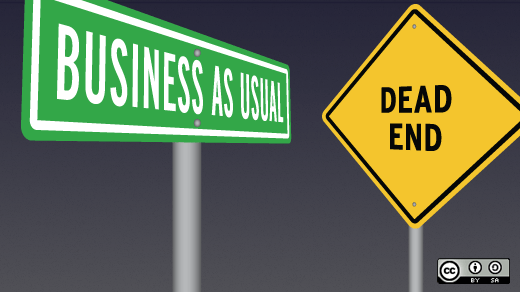I’m a capitalist by conviction and profession. I believe the best economic system is one that rewards entrepreneurship and risk-taking, maximizes customer choice, uses markets to allocate scarce resources, and minimizes the regulatory burden on business. If there’s a better recipe for creating prosperity I haven’t seen it.
This article was originally posted on the Management Innovation eXchange (MIX), an open innovation project aimed at reinventing management for the 21st century.
So why do fewer than four out of ten consumers in the developed world believe that large corporations make a “somewhat” or “generally” positive contribution to society? (This according to a 2007 study by McKinsey & Company.) Why is it that only 19% of Americans tell pollsters they have “quite a lot” or a “great deal” of confidence in big business? (In the 2010 Gallup survey, only Congress scored worse.) It seems that a majority of us expect big companies to behave badly—to ravish the environment, exploit employees, and mislead customers. When it comes to feckless irresponsibility, big business seems to be in the same league as Tiger Woods and Lindsay Lohan.
Some blame Wall Street for this state of affairs. In March 2009, the Financial Times claimed that the “credit crisis had destroyed faith in the free market ideology that has dominated Western thinking for a decade.” Around the world, hyperventilating pundits and grandstanding politicians argued that a new model of capitalism was needed—one that would make executives even more accountable to legislators and bureaucrats. Statists spied in the calamity a once-in-a-lifetime opportunity to enlarge their regulatory fiefdoms—and moved swiftly to do so.
While one should never underestimate the ability of risk-besotted financiers to wreak havoc, the real threat to capitalism isn’t unfettered financial cunning. It is, instead, the unwillingness of executives to confront the changing expectations of their stakeholders. In recent years, consumers and citizens have become increasingly disgruntled with the implicit contract that governs the rights and obligations of society’s most powerful economic actors—large corporations. To many, the bargain seems one-sided—it’s worked well for CEOs and shareholders, but not so well for everyone else.
You don’t have to read Adbusters to wonder whose interests big business really serves. When it comes to “free markets,” there’s plenty to be cynical about.
If individuals around the world have lost faith in business, it’s because business has, in many ways, abused that faith. In this sense, the threat to capitalism is both more prosaic and more profound than that posed by marauding bankers—more prosaic in that the danger comes not from the esoteric schemes of “rocket scientists” but from the slowly accreting frustrations and anxieties of “ordinary” folks; and more profound in that the problem is truly existential—it threatens to burden every large company with the sort of regulatory constraints that were once reserved for nuclear power plants. No amount of cuddly, “here’s how much we care” PR is going to avert this danger.
Some may bemoan the fact that capitalism (broadly defined) has no credible challengers, but it doesn’t. Like democracy, it’s the worst sort of system except for all the others—and that’s why each of us has a stake in making it better. If we fail to do so, the growing discontent with business will embolden all those who believe CEOs should answer first and last to civil servants—to those who are eager to replace invisible hand of the market with the iron hand of the state.
This is not an outcome most of us would welcome. While cinching the regulatory straitjacket even tighter would protect us from capitalism’s worst excesses, it would also rob us of its bounties. So we must hope that executives will face up to the fact that an irreversible revolution in expectations has occurred.
Millions of consumers and citizens are already convinced of a fact that many corporate chieftains are still reluctant to admit: the legacy model of economic production that has driven the “modern” economy over the last hundred years is on its last legs. Like a piece of clapped out engine, it’s held together with bailing wire and duct tape, frequently breaks down, and befouls the air with noxious fumes.
While we’re grateful that someone invented this clattering, savage machine a century and more ago, we’ll also be happy when it’s finally carted off to the scrap yard and replaced with something a bit less menacing.
We know the future cannot be an extrapolation of the past. As the great grandchildren of the industrial revolution, we have learned, at last, that the heedless pursuit of more is unsustainable and, ultimately, unfulfilling. Our planet, our security, our sense of equanimity, and our very souls demand something better, something different.
So we long for a kinder, gentler sort of capitalism—one that views us as more than mere “consumers,” one that understands the difference between maximizing consumption and maximizing happiness, one that doesn’t sacrifice the future for the present, and regards our planet as sacred.
So what stands in the way of creating a conscientious, accountable, and sustainable sort of capitalism—a system that in the long-term is actually habitable?
It is, I think, a matrix of deeply held beliefs about what business is for, whose interests it serves and how it creates value. Many of these beliefs are near canonical (at least among CEOs of a particular generation or ideological bent). They are also narcissistic and archaic. Among the most toxic . . .
- The paramount objective of a business is to make money (rather than to enhance human well-being in economically efficient ways).
- Corporate leaders can only be held accountable for the immediate effects of their actions (and not for the second and third order consequences of their single-minded pursuit of growth and profitability).
- Executives should be evaluated and compensated on the basis of short-term earnings (rather than on the basis of long-term value creation, both financial and social).
- The way to establish a business’ social credentials is through high-minded mission statements, green-tinged products, and a fat CSR budget (rather than through an unshakeable and sacrificial commitment to doing the right thing).
- The primary justification for “doing good” is that it helps a company to “do well.” (The implication: a company should do good when there’s an upside and something less when there’s not).
- Customers care a lot more about value for money than they do about the values that were honored (or defiled) in the making and selling of a product.
- A firm’s “customers” are the folks who buy its services (rather than all those whose lives are impacted by its actions).
- It’s legitimate for a company to make money by exploiting customer ignorance, exaggerating product benefits, and constraining customer choice.
- Market power and political leverage are acceptable ways of countering a disruptive technology or thwarting an unconventional competitor.
- Business is about advantage, focus, differentiation, superiority, and excellence (and not about love, joy, honor, beauty, and justice).
Perhaps these self-serving convictions were less objectionable 57 years ago when General Motors’ then–chairman, Charles Wilson, proclaimed that “what is good for GM is good for America.” But today, they are discordant and dangerous. It is no good pretending that perceptions haven’t changed or that capitalism’s critics are simply misguided. There is a growing consensus that rampant consumerism debases human values; that pell-mell growth imperils the planet; that unchecked corporate power subverts democracy; and that myopic, profit-besotted CEOs are as likely to destroy value as create it.
I am an ardent supporter of capitalism—but I also understand that while individuals have inalienable, God-given rights, corporations do not. Society can demand of corporations what it likes. That’s why self-serving beliefs are also, ultimately, self-limiting.
Of course, as consumers and citizens, we must be acknowledge that companies can’t remedy every social ill or deliver every social benefit. We must also face up to our own schizophrenia. We can’t expect companies to behave responsibly if we blithely abandon our own principles to save a buck.
As for executives: if you feel your industry is still too lightly regulated, if you secretly long for the regulatory fetters to be tightened even further, if you think that Sarbanes-Oxley, the Patient Protection and Affordable Care Act, the Restoring American Financial Stability Act, and Basel III don’t go far enough—then just keep on doing what you’re doing. If, on the other hand, you’ve had enough of sanctimonious politicians and meddling bureaucrats, then you must face up to a simple fact: In the years to come, a company will be able to preserve its freedoms only if it embraces a new and more enlightened view of its responsibilities. Many CEOs have already resigned themselves to this new reality, and a handful have eagerly welcomed it. There are others, though, who still cling to the belief that a company is first and foremost an economic entity rather than a social one. Sooner or later, these holdouts will discover that they face the same hard choice that confronts every teenager—drive responsibly or lose your license. For the sake of capitalism, let’s hope it’s sooner.
So then, dear reader, two questions: Are there other beliefs you belief represent a threat to capitalism? And more generally, what do you think needs to be done to rehabilitate capitalism’s tarnished reputation?
And finally, a really important recommendation. If you’re eager to dig deeper into these issues, pre-order Umair Haque’s new book, “The New Capitalist Manifesto: Building a Disruptively Better Business,” to which I wrote a short foreword. Umair, who writes with uncommon wit and passion, draws a host of essential lessons from companies that have already embraced the challenge of reinventing capitalism. The New Capitalist Manifesto was launched in January, and I expect it to become one of the most talked about books of 2011.
This post was originally published on Gary's Wall St. Journal blog.







9 Comments